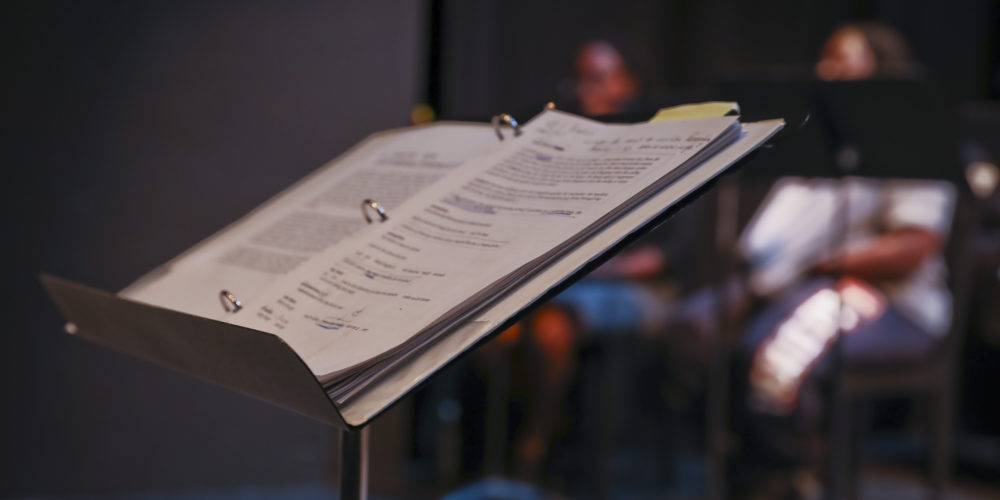08 Jan Bennett Fisher Artist Talk

Bennett Fisher
What made you want to become a writer?
I studied theater in college and initially wanted to pursue acting. When I graduated and moved back to the Bay Area, I bounced around doing a lot of different things – acting, dramaturgy, directing, assistant directing, so on. I wrote a few short plays, but writing wasn’t my primary focus. As time went on, however, I found myself feeling emotionally disconnected from a lot of what I saw onstage. It was the height of the financial crisis, but so many theaters were producing plays that felt totally disconnected from what was happening in the larger world. My first full-length play was based on Goldman Sachs’ scheme to profit from the Greek debt crisis, and wove together Greek mythology with a true story about financial intrigue. Thinking back, I can see my inexperience as a writer in that play, but I think it struck a chord with people at the time (as much as I can say that about my own work without sounding immodest) because it was dealing with something that felt very immediate. I realized that, as a writer, I had more agency in creating the kind of theater I wanted to see. I also loved the collaborative process of developing new plays much more than working on established texts. So, little by little, it became more of my focus and the other things fell away.
What does the day-to-day process of playwriting look like for you personally?
I try to write for at least four hours a day, without exception. The “without exception” part is much harder during the pandemic. Even though I’m at home all the time, it’s a lot harder to find the energy and focus. Nevertheless, as writing becomes more and more my primary source of income (not plays, necessarily, but even so), my relationship to the writing process has changed. I try not to think about it terms of my mood. I feel if writing is (or you want it to be) your profession, you need to treat it as such. You’re not always in the “mood” to go to your day job, but you have to go anyway. A writer writes. Some days, you’re really inspired. Some days, it’s a slog. But you only get the days of inspiration when you’re willing to move through the slog. I found by giving myself a set goal of four hours a day means that I get less wrapped up in whether it was a “good” day or a “bad” day. I feel good about putting in the time.
What was the impetus for writing a pandemic-era radio play?
When the pandemic began, it was clear that we weren’t going to be back to in-person performance anytime soon. Rather than waiting for the theaters to reopen, I wanted to write something that could live without needing physical space. If we can’t get back into the theaters, we have to find a way to create art another way. That responsibility falls on organizations, but also on artists. There’s certainly a version of this play that can be performed live onstage, but I found that removing any visuals from the narrative empowered me to find ways to excite the listeners’ imagination. Horror, as a genre, so often relies on only seeing a tiny part of what terrifies us. And that relates to the “pandemic” part of the question. The play amplifies the feelings we’ve experience around the pandemic. Our great loneliness combined with the fear of human contact, our desire to feel safe in our homes and instead feeling trapped. Plays don’t need to be “ripped from the headlines,” but they do need to find a way to touch on something that feels immediate. When I write, I try to look for a kind of cultural nerve ending. Even if loneliness and fear are universal, they mean something different this year. So my writing needs to be attuned to that. As for the “radio” part – I’ve always loved radio plays, since I was a kid. It’s partially because I was very slow learning to read and audiobooks were easier, but also because I feel I can imagine a story better when I hear it. I still listen to a ton of audiobooks, because I like being able to enjoy the pleasure of reading even when I’m driving or cooking or out on a walk or whatever.
What is it about playwriting that you feel effectively told the story you wanted to tell, especially over other forms of storytelling?
I think plays do a great job creating a sense of immediacy and claustrophobia. For instance, if you read a horror short-story and a character screams, the emotional effect is very different than hearing an actor scream in a performance. But I don’t really think the medium determines what story you want to tell. We see successful adaptations of narratives across many different mediums all the time, and telling ourselves things like “plays can do this and not that” and “novels can do this and not that” only limits our idea of what’s possible. I wrote a play because I like playwriting. I like that it is collaborative and inclusive. Each role in this play is written specifically for the four actors in this reading. These are people I love, whose artistry inspires me. I wrote the play for them.
Is there any message or anything in particular that you want the audience to take away from your play?
Not really. When someone asked Samuel Beckett what his plays were about, he said “My plays are not about something, they are something.” I love that idea. When you’re listening to the play, I hope you can be fully engaged by the experience. You can reflect on whatever meaning or message it has when it’s over. I hope the play resonates with people but that’s different than wanting the play to serve as a vehicle for delivering a particular message. Early on, I thought a lot about what kinds of messages my plays sent. I don’t so much anymore. Now, when I feel a writer is trying too hard to send a message, I feel talked at rather than engaged with.
When writing your play, were you writing for any particular audience? If so, how do you think this affected the writing?
My family and most of my close friends are not artists. When I begin new a play, I think a lot about how they might react to what I’m writing. They’re intelligent, curious people, but they don’t necessarily go to a lot of live theater. I worry theater has become too insular – partially because we are constantly reviving plays, but also because many of the new plays don’t seem very new. Plays about making plays, new plays that reimagine old plays, or new plays that feel steeped in a certain type of established aesthetic tradition can form a kind of artistic ouroboros. I don’t consider myself an avant-garde playwright in terms of form, but I do find myself drawn to subjects that I don’t frequently see dramatized. If I ever write a play about a playwright writing a play, someone should saw off my hands.
Are there any contemporary plays that inspire you?
Hundreds. I’ve had a lot more time to read during the pandemic, and I’ve found myself going back to many plays from the last decade that stuck with me. Recently, I’ve enjoyed rereading Truth and Reconciliation by Debbie Tucker Greene, Portugal by Elizabeth Heffron, and Trayf by Lindsay Joelle, just to name a few. My dramaturg for this reading, Ashley Smiley, is a crackerjack playwright in her own right. I’ve enjoyed getting to know her work this year. It’s hard to find a lot of published new plays, but there’s a ton of great writers on New Play Exchange.
Were there any specific past theatrical movements that inspired your work?
I went back and listened to War of the Worlds by Orson Welles, because it’s so iconic. Towards the end of the first act, when the Martians start attacking, there’s a lot of military radio chatter, these long stretches of dead air, people calling for help across the airwaves and receiving no answer. Welles and his team do such an amazing job of creating a sense of chaos and uncertainty. You don’t exactly know what is happening, but you know it’s very, very bad. I’ve thought back to that moment a lot writing this play. In stories grounded in horror and suspense, you don’t always have to worry about things being clear, so long as they’re not boring.
Reserve your Pay What You Can tickets now.
Monday, January 11 at 7:30pm PST
Wednesday, January 13 at 7:30pm PST
Bennett Fisher is a member of Campo Santo and the Playwrights Foundation’s Resident Playwright Initiative, as well as a former Artistic Associate and and Shank Fellowship Playwright in Residence at Victory Gardens Theater in Chicago. His plays include Candlestick, Damascus (Samuel Goldwyn Award, BAPF, O’Neill Conference finalist), Borealis (Alliance/Kendeda Prize finalist), Don’t Be Evil, Campo Maldito, and the dialogue for the immersive theater experience The Speakeasy. He is currently developing film and TV projects with Gosh Films, Pandemonium Films, and Constantin Films. He received his MFA from UC San Diego. More at bennettfisher.net
About Shelter: In the winter of 2020, a young Bay Area couple retreat to the Sierra mountains to take shelter from the pandemic and repair their fracturing relationship. When a stranger arrives at their door seeking help after an accident, they are forced to weigh their personal safety against the desire to assist someone in crisis. A radio play for the age of Covid-19, Shelter explores the limits of empathy, the suspicions we have about one another, and the terror of living in a world where threats can take any form.



No Comments